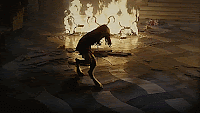Getting close to the end now.
I want to talk now about incorporating feedback. I know to some folks this doesn’t sound like a vital part of “writing my first novel,” but I personally think it is. One of the reasons my “college novel” (Trinity) crashed and burned was that I got really hung up on early feedback. I tried to figure out how to please everyone because I gave everyone’s thoughts equal weight. I still see that happening today—people who want to somehow listen to every voice and incorporate every note. Even contradictory ones. I’ve seen people spend years trying to do this.
Also I know it may also seem a bit weird that this part and the last one have been split into two posts. It might seem feedback and revisions go hand and hand. On one level, yeah, they do, but I think the criticism half of it is important enough to warrant its own focus for a bit. Being able to accept feedback from knowledgeable sources is a big thing for a writer. It’s taking a huge step forward. And I think it’s really, really tough to write a good book if I can’t take that step. So it really is a separate, important step in the process.

Plus, splitting them up this way gave me an even twelve parts for the A2Q.
All that said, let’s talk about incorporating notes
The first thing we need to talk about is sorting the feedback. Not all criticism is created equal and valid, despite what that guy on the internet shrieked at you. We need to take those fifteen page packets of notes, and the copies of your manuscript with notes up and down the margins, and figure out what’s what. You can do this on the fly, break it all down before you actually start the revisions, or whatever works for you.
I think the overwhelming amount of feedback we get is going to fall into one of three categories—opinions, advice, and facts. Being able to figure out which one’s which is going to be tough. It’s also going to be a skill you can use forever. It’ll help you throughout your writing career, and probably in other parts of your life, too. A lot of folks think their angry opinions are facts. Some folks think they’re offering advice when it’s just an opinion. And some writers (yeah, it’s on us too) hear facts and advice and think they’re just opinions.
Let’s go over them.
First up is opinions. An opinion is someone’s personal thoughts about a topic (in this case our clearly flawless werewolf manuscript). Opinions don’t need anything else behind them. They can just be a gut response. They’re super-subjective and they can carry a lot of baggage.
They’re also, by and large, the first thing to toss. If someone’s just scribbling “that’s stupid” in the margin or “werewolf stories are so overdone,” I tend to ignore them. I once had a beta reader cover The Suffering Map with red ink because they decided everything in the manuscript was wrong because characters made decisions they didn’t like.

Now, I’m not saying opinions have no value. They do, but only in a “general direction” sort of way. An individual opinion really doesn’t mean much, in this instance, while a dozen identical opinions have a bit of weight. Maybe. If only one person thinks I telegraphed Luna being the werewolf too much, they’re probably just reading too much into it. I know some folks who have a bad habit of retroactively adjusting their awareness/expectations, so they “always” saw that twist coming (because if they didn’t, it means they got tricked like everyone else). But if most of my beta-readers (and agent and editor) think I telegraphed it… maybe I did.
Next is advice. In pretty much any sense, this is thoughts and ideas that have an actual rationale behind them. A big difference between advice and opinions is I can almost always explain the reasoning behind my advice in an objective way. I’ve mentioned this little factoid before—anyone can say “this sucks” but it’s a lot harder to be able to explain why something sucks. Sometimes advice is self-evident, other times it may need a line or three of explanation.
For example, one setting in the werewolf book is the bar Phoebe works at, and some reader might point out “Should some people be wearing masks here at the bar? It’s your most crowded location, and even optimistically when this book comes out it’s probably still going to be a very common sight.” It’s the reader’s idea, but we can all see the logic and the chain of reasoning behind it. Or they might get halfway through the manuscript and point out “Wow, Phoebe is coming across as kinda dumb,” and offer a few examples that have happened so far.
Last are the facts. These are, well, I mean, they’re facts. No alternatives. If you tell me I spelled Jake Gillanhall wrong, it’s something we can both look up pretty easily because there’s a definitive answer. If the last words in my book are To Be Continued and you tell me there’s no ending, you’ve caught me dead to rights. If you tell me the full moon doesn’t actually last five nights and we traveled there in 1969, you’re absolutely correct.
Worth mentioning, sure, maybe those mistakes are there on purpose. It might be a clue that someone thinks we landed on the Moon in 1955 and there could be a good reason why I have a bunch of spelling mistakes. But (as I’ve mentioned once or thrice before), it should be very clear to the reader that these are deliberate mistakes, not accidental ones. I’ve always been very leery of “journal” books that have a bunch of misspellings and use the excuse of “it’s the character making mistakes.” I know this kind of thing gnaws at editors, too. So if my beta readers don’t get that this is deliberate, if they think it’s an actual mistake… I may want to think about that.
Now that I’ve got them sorted, the next step is weighing them. This is one of the reasons it might not be bad to have more than one person reading your manuscript. I still don’t think it’s good to get ten or twelve or more folks, but having a well selected five or six can still give me a lot of viewpoints—and possibly some opposing ones.
Then I just start going through them page by page. Personally, I like to do it all at once. Here’s everyone’s thoughts on page one, everyone’s thoughts on page two, everyone’s thoughts on… you get the point. Yes, it’s a bit slower to go this way, but it also lets me get reactions all at once rather than getting Reader A’s responses on this page right now, Reader B’s responses in three days, and Reader C’s sometime next week. This also saves me from spending a lot of time rethinking the page because of A and B’s thoughts, only to finds out later C, D, and E all really liked it. And so did I, hopefully, because I wrote it.
That’s how a lot of this will go. Weighing how people respond to different things. Everybody likes Phoebe and dislikes Luc (just like they’re supposed to). But everybody also thinks the description of Phoebe’s armor is just… bad. The unanimous ones are the easy notes to get. Everyone hates this, everyone loves that. The big thing is to actually read them, to not give in to that instinct to just brush the bad comments aside.
Sometimes, it’ll take a little more back and forth. If one of my beta readers thinks there’s a little too much sex and innuendo in this werewolf book, but two others have no comment and the fourth keeps adding comments saying “Ohhhhhhh yeahhhhh”… that’s kinda evenly split, arguably positive. One thinks it’s a negative, two don’t seem to mind either way, and one likes it. I should consider that and weight changing it appropriately
Likewise, if three of them hate it and one likes it… well, maybe this needs some work. Sometimes I just need to accept that sometimes things just don’t work the way I’d hoped they would. It sucks, but it’s better that I’m learning it from three or four people I know rather than a potential agent or publisher. Definitely better than hearing it from the two hundred people who decided to leave reviews.
A few other things to consider. If a lot of readers are suggesting something doesn’t work, they’re probably right. If they’re telling you how to fix it… they’re probably wrong. This is your project. Your art. People can suggest whatever they want, but the only person who knows what it needs is you. Don’t get bullied down a path you don’t actually want to go down. Look at the notes, look at your manuscript, figure out what’s going to make it work.
On a related note, yeah, sometimes we also just need to put our foot down and say “the space cantina stays in!” Because this is art (our art, anyway) there are going to be things that might not be totally logical. They may be a bit more excessive and flowery (or violent and horrific, or sexy and scandalous) than they arguably need to be, but in my mind this moment or this character or maybe this chapter needs to be there, Maybe it’s not necessary for the narrative or dramatic structure, but it’s important for the world. So even if everyone thinks it’s unnecessary and/or a bit distracting… I’m keeping the space cantina.
I do need to keep track of how often I’m putting my foot down, though. If there are dozens of instances where my readers are pointing out logical, reasonable things about the manuscript and I think I need to put my foot down on every single one of them… maybe I’m not as open to feedback as I’m telling myself. Might be worth taking a few steps back, having that stiff drink we mentioned last time, and starting over.
Like I mentioned above, this whole process can take some time, but I really think it’s worth it. So much of writing is done alone (and let’s face it—a lot of us tend to lean toward the introvert side) that our internal empathy scale can drift a bit. It’s good when we’re starting out—and honestly, I think, even after we’ve had a degree of success—to have someone we trust help us recalibrate that scale.

Also worth mentioning… Your mileage may vary, but after I do all of these revisions, I try to do one more line-by-line read through. I’ve learned (the hard way) with all these tweaks and revisions, something often slips by. Just a little thread I didn’t snip or tie off. Like maybe at some point I gave a bunch of Luc’s dialogue to Quinn, but I forgot to change some pronouns and now trying to follow who’s talking is a mess. Or at one point I decided Luc would be called Etienne (to cut down on any possible Luc/Luna confusion) and missed a few here or there. Or maybe I cut a whole awkward (on many levels) discussions about safe sex between Phoebe and Luna from chapter four, but they still refer back to it in chapter fifteen. This is a big house of cards and it’s not hard for something to get overlooked when those cards get shuffled.
So hopefully this’ll help you put some of that feedback in perspective and let you sift through it.
There is one part left to the A2Q. One final lesson to impart, my young apprentice. Apprentices? Apprentici? How many of you are even reading this?
Until then, go write.












